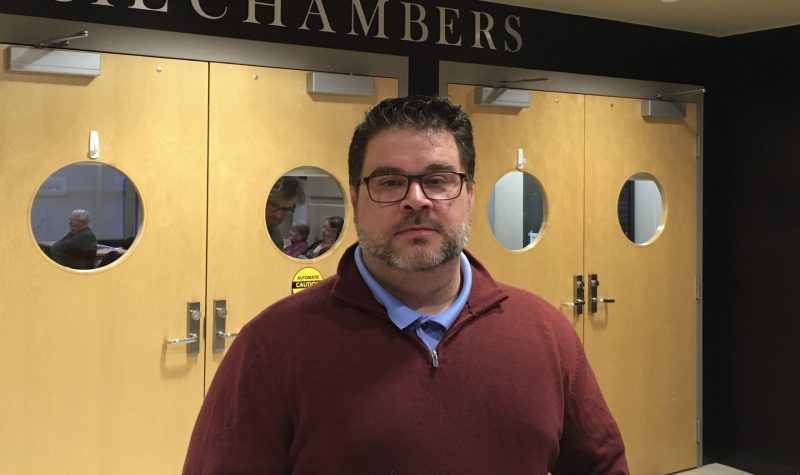About 50 people gathered in the gallery of Tantramar council chambers on Tuesday night, the majority there to hear a presentation by former councillor Ken Hicks, asking council to consider changes to the town’s taxation system.
Hicks lives in Frosty Hollow, within the former town of Sackville boundaries, but in a decidedly rural setting, with no access to water and sewer, and other amenities like street lights and sidewalks. But his tax rate is the same as the one charged on properties in other parts of the former town, where services like water and sewer and sidewalks are de rigeur. His predicament is similar to that of the Greene family, his in-laws, which CHMA reported on in March.
While the current amalgamation kicked off the recent protest from Hicks and the Greenes, their issue is a longstanding one. In his presentation Hicks harkened back to the source of his concern: a 1975 annexation of parts of Frosty Hollow, as well as Middle and Upper Sackville, into the then town of Sackville.
“At that time a commitment was made to provide services to these areas,” Hicks told councillors, “and 48 years later, we’re still waiting.”
Hicks told council that when Tantramar amalgamated, he and some of his neighbours expected that their tax rates would be changed, based on comments by local government minister Daniel Allain, who repeatedly stated that residents would only be taxed on the services they receive. Hicks interpreted that to mean that tax rates would be adjusted to reflect services such as water and sewer, and other general town services.
For the town’s part, acting treasurer Michael Beal says that water and sewer services are covered by the town’s utility budget, and not its general fund. The utility budget takes in money through water bills, and pays out for repairing water mains, replacing infrastructure, and maintaining the water treatment plant and sewage lagoons. The utility budget also sets aside reserves and borrows money to fund major projects like the construction of a water tower in 2010 (which also saw 2/3 costs covered by federal and provincial contributions.)
Beal says that’s the way it’s been since he started with the town in the mid-90’s, but Hicks says this wasn’t always the case, and that, “money collected in the past has paid for the current infrastructure that’s in place.”
“We have to bear in mind what promises were made in the past,” said Hicks after Tuesday’s meeting. “Nothing’s ever been told to people why services aren’t being extended.”
While Hicks’ focus was on water and sewer services, what he called “the core items”, he also told council that many of the shared services covered by the town’s general budget are not necessarily used by people outside the town core.
“There’s a clear disconnect when speaking to town hall about services,” said Hicks. “I’m not certain that they understand the expectations of the community as a whole for services, and how the services needs differ by property owner.”
Hicks named parks as something that families outside of the downtown care seldom use, and also said that, “bolstering the downtown core is not a service to those outside of it.” He acknowledged that the Civic Centre and recreation programming are widely used, but said the Civic Centre was similar to a ratepayer service, because residents and clubs pay fees to book the centre.
Councillors mostly reacted to Hicks’ presentation by referring to the fact that province had control of tax rates for 2023, while at the same time promising to look into possible changes to the tax system in 2024.
“Now that we have the full authority to be able to make these decisions on our own, without being corralled by the province, a more fulsome discussion about what our budget [and] the taxation rates would look like can happen,” said Mayor Andrew Black after the meeting. “What that looks like, I don’t know, but I think we need to have a bigger conversation about what taxation is going to look like.”
None of the other 50 or so people in the room had a chance to address council on Tuesday, though many rumblings throughout the meeting indicated some would have liked to. Hicks said he’d like to see council open up the discussion and get more input from people who feel they have been unfairly taxed.
The town’s new provincially-enacted bylaw eliminated Sackville’s traditional question periods, but allows for public presentations at regular meetings. Members of the public can register a week in advance for the opportunity to make a five minute presentation, or they can sign-in with clerk Donna Beal at the meeting for the opportunity to make a two-minute presentation.
An online group organized by Alyssa Greene has indicated they are looking for more people to present to council in their next regular meeting in May.


